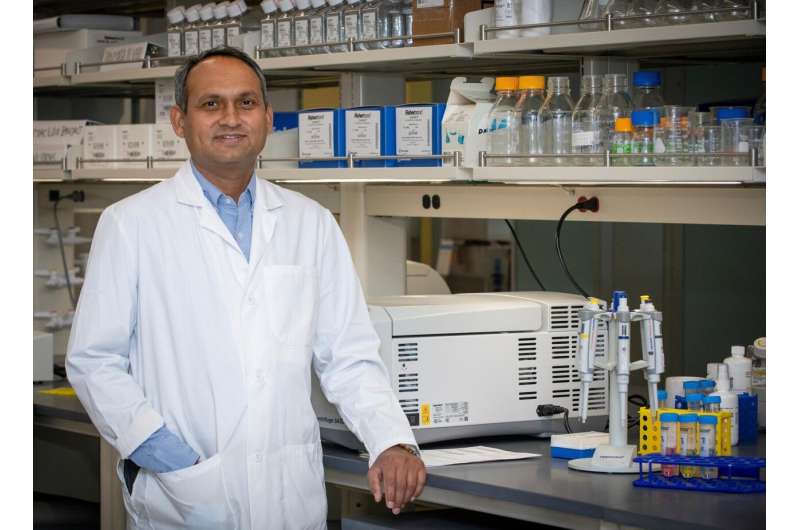In search of individualized heart failure therapies, Ganesh Halade, PhD, an associate professor of cardiovascular sciences at the University of South Florida Health (USF Health) Morsani College of Medicine, leads a team studying unresolved inflammation after heart attack. Credit: USF Health/University of South Florida
Blocking the fat-busting enzyme lipoxygenase with a synthetic inhibitor throws the immune system's innate inflammatory response out of whack, compromising cardiac repair during acute heart failure, USF Health researchers found.
Their new preclinical study was published April 13 in Biomedicine & Pharmacotherapy.
Acute heart failure—triggered by a heart attack, severely irregular heartbeats, or other causes—occurs suddenly when the heart cannot pump enough blood to meet the body's demands.
Following a heart attack or any cardiac injury, signals to immune cells called leukocytes carefully control physiological inflammation. Normally, there are two distinct but overlapping processes: an acute inflammatory response ("get in" signal), where leukocytes travel from the spleen to the injured heart to start removing dead or diseased cardiac tissue, and a resolving phase ("get out" signal), where inflammation is cleared with the help of macrophages that arrive to further repair the damage and form a stable scar.
A delay in either the initiation of inflammation or its timely clearance (resolution) can lead to impaired cardiac healing and progression to heart failure, said study principal investigator Ganesh Halade, Ph.D., an associate professor of cardiovascular sciences at the USF Health Morsani College of Medicine and a member of the USF Health Heart Institute.
The USF Health researchers applied three investigational approaches (in vitro, ex vivo, and in vivo) to assess whether a potent lipoxygenase (12/15 LOX) inhibitor ML351 could selectively alter inflammatory responses in adult mice following cardiac injury similar to a heart attack. Previous studies by Dr. Halade's laboratory reported that lipoxygenase-deficient mice showed improved cardiac repair and heart failure survival after cardiac injury.
"We wondered if blocking a lipoxygenase with an external pharmacological compound (drug) would have the same beneficial effect—but the answer was no," Dr. Halade said. "Instead, the collective results of our study indicate that ML351 dysregulated control of the normal physiological pathway of inflammation in cardiac repair, causing collateral damage."
In the mice treated mice with ML351, leukocyte recruitment to the site of cardiac injury was delayed, which subsequently amplified inflammation at the site. At the same time, instead of leaving once the repair job was done, the immune cells remained at the site beyond the typical acute (and beneficial) inflammatory response phase. Basically, the late arrival (get-in signal) and delayed clearance (get-out signal) of immune cells impaired cardiac repair, Dr. Halade said.
The latest study helps explain one more piece of the puzzle about the important role of immune-mediated acute inflammation and its clearance—both in promoting cardiac health and stopping the progression of heart failure, Dr. Halade said. Lipoxygenases, fatty-acid modifying enzymes that control metabolic and immune signaling, can promote either resolving (beneficial) or nonresolving (harmful) inflammation, he added.
"The take-home message is do not mess with (block) the lipoxygenase. Preserve it, because it's a key enzyme for our defensive, innate immune response," he said. "Knowing how drugs interact with the body's precisely-balanced immune responses will be critical for understanding mechanisms to prevent, delay or treat the unresolved inflammation influencing heart failure."
More information: Bochra Tourki et al, Lipoxygenase inhibitor ML351 dysregulated an innate inflammatory response leading to impaired cardiac repair in acute heart failure, Biomedicine & Pharmacotherapy (2021). DOI: 10.1016/j.biopha.2021.111574
Provided by University of South Florida























